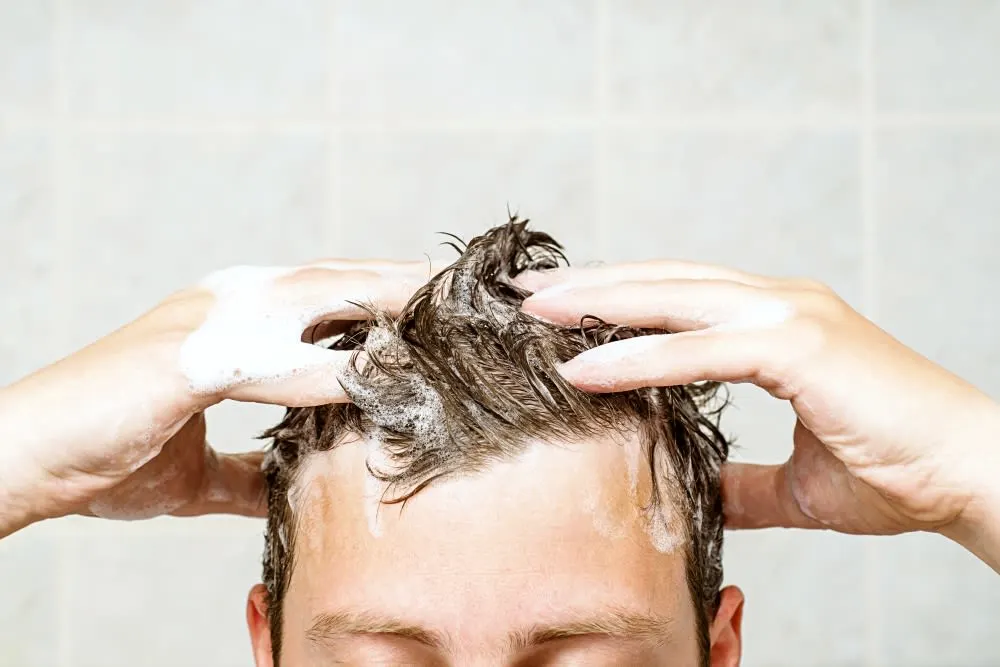Flaky Scalp Shampoo 101: How To Correctly Use Your Shampoo For Flakes

The most basic hair care product representing the largest segment of hair care cosmetics i.e. shampoo. The shampoo is a type of viscous liquid, which contains some percentage of water in it. Shampoo was something that came after the invention of soap and shampoo replaced soap when it came to hair care cosmetics. In day-to-day life, our hair takes a lot of damage due to various environmental pollutants. When water alone is not capable of removing these pollutants from our hair, that’s where an anti-dandruff shampoo works its magic. We have come a long way where shampoo is the most demanded hair product in the world. And when we talk about dandruff, anti-dandruff shampoo is the first thing that comes to our mind to fight dandruff. Many problems are caused due to dandruff. Perhaps the most troubling one is the formation of flaky skin. Dandruff causes the skin to become dry and form flakes on your scalp. The formation of these flakes is a major concern among the mass, as it is contagious and difficult to treat.
Every anti- dandruff shampoo is specially formulated to deal with both the symptoms and cause of dandruff. This is made possible due to zinc pyrithione, which research has shown to be among the most effective ways of dealing with dandruff.
Luckily, treating dandruff and flakes, itching and dryness is easy – just use an anti-dandruff shampoo that’s been proven to work on all the signs of dandruff.
Some Benefits Of Using Anti-Dandruff Shampoo
- Repairs damaged hair:
An anti-dandruff shampoo contains a variety of components, which help in repairing the damaged hair, due to environmental factors. It has all the right ingredients like zinc pyrithione and salicylic acid which helps remove dandruff and prevents it from coming back.
- Provides important nutrients to hair follicles:
Hair needs proper nutrients for healthy growth, and anti-dandruff shampoos are designed to provide the required nutrients to the hair, for proper growth. Several variants of Head & Shoulders like Lemon, Supreme with aloe vera and argan oil and mint help add that nutrition to your scalp.
- Removes a variety of pollutants from hair:
Environmental pollution is a prevalent problem today and there are many hazardous pollutants in the environment, which could damage the hair immensely. So, what a good anti-dandruff shampoo does is it removes these pollutants from your hair and keeps your hair healthy.
- Fights dryness and oiliness of hair:
Dryness and oiliness of hair is a major concern for many people. And certainly, neither of them looks good on hair. An effective anti-dandruff shampoo contains surfactants which help in removing the oil from hair and when it comes to dry hair, it also contains moisturizing agents, which remove dryness from hair and helps to regain the much-desired lustre.
- Relieves from scalp irritation:
Sometimes due to dry hair, flakes are formed on the scalp which causes irritation in the hair scalp. Anti-dandruff shampoos work as cleansing agents for these dry flakes and re-moisturize the scalp.
Steps On How To Apply Shampoo On Hair
Always wondered how to use a shampoo in the best possible way? Read on to find out how to apply shampoo on hair in such a way that you make the most of your favourite anti-dandruff shampoo.
- Comb your hair gently before taking a shower as this would help in removing tangles and shafts.
- Get your hair a little damp, before applying anti-dandruff shampoo, get your hair a little wet with warm water, and then apply shampoo on your hair and massage it gently.
- Rinse your hair with cold water after applying the anti-dandruff shampoo on your hair, rinse it gently with cold water in a downward manner.
- Dry off your clean hair gently - After the bath, gently blot your hair using a towel, and after it gently rub your hair with a towel and let it dry naturally. Just follow these few tips and never have daunting questions like ‘how to apply shampoo?’ bother you ever again! (Note: using a blow dryer may damage hair follicles, so it's better to let it dry naturally).
Common Mistakes While Applying Scalp Shampoo
- Applying any anti-dandruff shampoo before getting your hair wet:
Don’t ever apply dandruff shampoo without getting your hair a little wet. Shampoos are viscous liquid and it will stick to your hair if the water is not applied.
- Don’t apply an anti-dandruff shampoo directly on your hair:
Applying shampoo directly to your hair may not be as effective. So first apply some of your favourite anti-dandruff shampoo on your hands, try to build some lather and then apply it on your hair. This would be make it more efficient.
- Don’t use your nails to rinse the shampoo:
While rinsing the shampoo, many people use their sharp nails to rinse shampoo throughout their hair, this may cause damage to the scalp, so you might want to avoid doing this.
- Don’t use too hot water:
A hot bath is a very pleasant experience in a cold environment but is it not wise to use hot water on your scalp. Using water above a certain temperature may damage your hair follicles, so you should avoid applying high-temperature water on your head, as it might be fun, but it would cost your hair.
- Rinse the shampoo thoroughly throughout your head:
After you have applied anti-dandruff shampoo on your hair, you should rinse your hair thoroughly throughout your head and be as gentle as possible.
How To Shampoo Your Hair And How Much Shampoo To Use
The quantity of shampoo that should be applied is an important step towards your hair care. We often ignore the proportion of shampoo to be used at once. The proportion of shampoo usage depends on many factors and only after considering them we can come up with an optimum conclusion. These are some hair washing tips you should consider:
- Length of your hair
- Hair type
- Types of hair problems you are facing
- The frequency of shampoo usage
- The texture of your hair
Different Types Of Shampoo
Shampoos since their invention have been diversified into many types and categories. These are the most prevalent ones:
- Anti-dandruff Shampoo:
The good old anti-dandruff shampoo is the best help you can get if you are looking to remove dandruff in a simple and hassle-free way. A decent anti-dandruff shampoo has all the right ingredients that will slow down the growth of Malassezia as well as the shedding of dead cells because of the allergy. Head & Shoulders is one of the best anti-dandruff shampoos you could use as it works wonders in removing dandruff in just one wash and prevents it from coming back too.
We recommend Head and Shoulders Silky Black Shampoo which helps in fighting dry scalp and dandruff and re- moisturizes the hair. It’s suitable for all hair types.
- Clarifying Shampoo:
The name says all about the shampoo which helps in clarifying any type of pollutant from your hair and revitalizes it.
The cool menthol variant of the Head & Shoulders not only keeps your hair fresh but also removes all the unwanted components from your hair including toxicants and dandruff. It keeps your hair minty fresh.
- Anti-Breakage Shampoo:
This type of shampoo is suitable for people who have damaged hair and hair fall. It repairs the damaged hair and prevents hair fall by revitalizing the scalp of the hair.
Head & Shoulders Anti-Hairfall Shampoo not only prevents hair fall but also acts as a dandruff solution and is also pocket friendly.
- Moisturising Shampoo:
People having dry hair problems are prone towards moisturizing shampoos in order to gain back the lustre in their hair. It can also be used for making hair stronger and shinier, it’s not a shampoo restricted only to dry hair people.
If you have dry hair problems, we recommend Head & Shoulders Smooth and Silky Shampoo, which revitalizes hair and nourishes them from inside, with a refreshing scent. It also keeps your hair and scalp healthy.
Dandruff is the most prevalent problem faced by people today. We can’t just get rid of that stuff. But, with every problem comes with a solution. Advanced cosmetic science has come up with a revitalizing agent in the form of anti-dandruff shampoos as an effective dandruff remedy.



